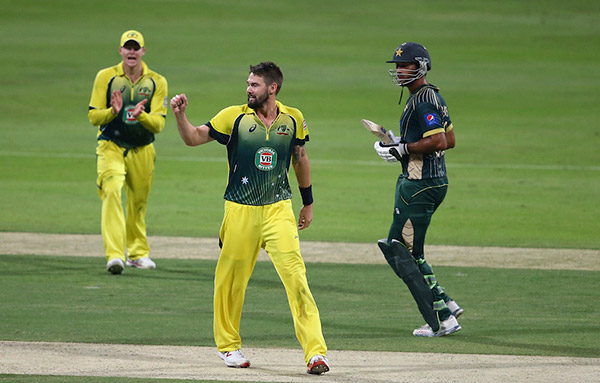 Abu Dhabi: At the toss, George Bailey had said his team had still not played the ultimate game despite being 2-0 up in the series. Given the way they batted, it was certainly not the ultimate game Australia were after; they lost their way from 102 for 1 in the 22nd over to end up with only 231 on the board, on a batsmen-friendly pitch. But if there was anything close to that ultimate game, it was the manner in which Australia’s bowlers turned the match around, especially in the last over – a double-wicket maiden from Glenn Maxwell when Pakistan needed just two to win, to complete the whitewash they were after.
Abu Dhabi: At the toss, George Bailey had said his team had still not played the ultimate game despite being 2-0 up in the series. Given the way they batted, it was certainly not the ultimate game Australia were after; they lost their way from 102 for 1 in the 22nd over to end up with only 231 on the board, on a batsmen-friendly pitch. But if there was anything close to that ultimate game, it was the manner in which Australia’s bowlers turned the match around, especially in the last over – a double-wicket maiden from Glenn Maxwell when Pakistan needed just two to win, to complete the whitewash they were after.
The eighth-wicket pair of Sohail Tanvir and Zulfiqar Babar had shown exemplary calmness under duress to chip away at the target. The batsmen survived a run-out chance – none of the Australian fielders seemed to appeal for a tight call – and added 22 runs with ease to bring the team to within two runs of a morale-boosting win. With the frontline bowlers having extinguished their quotas, and only a Maxwell over remaining, the win was finally within touching distance. But Tanvir swung at a full, straight delivery only to be bowled, then Mohammad Irfan struggled to make contact with the next three deliveries. When he finally made contact, off the last ball of the innings, he only managed a top edge that gave Australia their third ODI-series whitewash (minimum three matches) against Pakistan.
It wasn’t a tough target given the conditions, but Pakistan’s batting had been brittle throughout the series. That they were made to use all their available resources, and time, to get close was down to how Australia bowled. Mitchell Starc proved to be the ideal replacement for Mitchell Johnson, while Kane Richardson generated pace to trouble the Pakistan batsmen. The slide though was triggered by Xavier Doherty, who forced Ahmed Shehzad to play an ill-advised cut and struck timber. The Pakistan openers had added 56, but just like the second ODI, one wicket brought a few more. Pakistan lost their next two wickets for 24 runs.
There was another collapse later as Pakistan lost 3 for 20, but it had been preceded by an uplifting 74-run stand for the fourth wicket between Asad Shafiq and Sohaib Maqsood. However, once Afridi top-edged a pull off Richardson to be caught in the circle, Australia knew they were in with a chance. Umar Amin resisted, Anwar Ali played the odd jail-breaking shot, but no one survived to see the team through.
Misbah-ul-Haq, who had chosen to sit out owing his poor form, watched in agony as one batsman followed another. Pakistan had made wholesale changes to the XI, but their batting was the same glass sail in high winds. This must have been particularly galling to the team management, considering the bowlers had shown tremendous discipline – there wasn’t a wide or a no-ball in the first 45 overs – to restrict Australia for a below-par total.
Afridi was at the forefront of the effort, picking up the wickets of David Warner and Maxwell at crucial stages to slow Australia down. Others then joined in, sapping energy from Australia’s innings during the batting Powerplay, in which two wickets fell for the addition of only nine runs. Australia never recovered from the slump. Only four boundaries were struck in the last 20 overs.
Given the start Australia had, the dip was remarkable. Aaron Finch was circumspect during his 34-ball 18 but David Warner had no such trouble; he continued making the most of his form, powering Australia’s start after they had opted to bat. Pakistan’s bowlers bowled tight lines, with Sohail Tanvir getting the ball to wobble both ways, but Warner was authoritative. Three times he found the gap through cover to deliveries that were not quite on a driving length. And when it was pitched up on the pads, he was quick to find boundaries on the other side. The partnership was broken when Finch mistimed a chip to mid-on in the 11th over. The 48-run opening stand was still Australia’s best in their last nine outings against Pakistan.
Steven Smith, the only centurion in the series, started off with a couple of boundaries off Babar but stuck to picking up singles and doubles thereafter – Smith had to wait 85 balls for his third boundary. With the bowlers not giving much away and the field spread out, the boundaries were not easy to find. Only two more came during the Smith-Warner partnership, one of which was a six that took Warner to his half-century.
The twist came soon after as Warner lobbed one back for Afridi to complete a simple caught and bowled. George Bailey was dismissed in the next over for a duck. Maxwell was reprising his Dubai effort before he was brilliantly caught on the leg side boundary by Umar Amin, off Afridi. The score was 138 for 4 at that stage, and even though Smith was around, the innings stalled. Smith completed his half-century in 68 balls, but was not able to raise the pace. His third boundary came off his 92nd delivery and there wasn’t one thereafter. But Smith’s half-century underscored the importance of staying in for long enough, an area where Pakistan again fell short.
Australia 231 for 9 (Smith 77, Warner 56, Tanvir 3-40, Afridi 2-44) beat Pakistan 230 (Shafiq 50, Richardson 2-36, Maxwell 2-41) by 1 run


